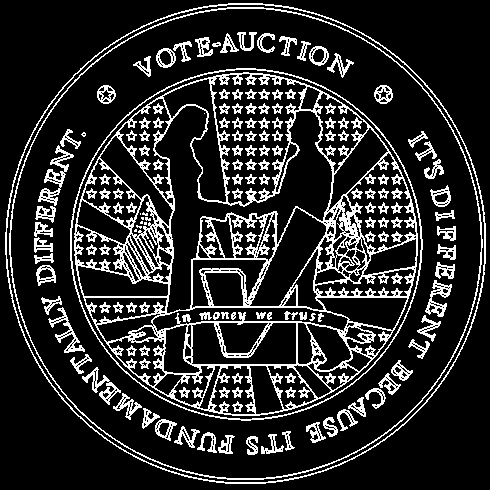This interview was conducted to accompany the presentation of UBERMORGEN’s work Vote-Auction as part of Net Art Anthology, Rhizome’s ongoing online exhibition of key works of net art.
Launched during the 2000 US Presidential election, Vote-Auction claimed to connect people who wished to sell their vote with potential buyers.
Michael Connor: How did the project begin?
UBERMORGEN: James Baumgartner invented the whole thing. He was from RPI, and he had this idea to do this Vote-Auction thing as a political statement. He did that and ran into serious troubles immediately with the New York City Election Committee. Soon after, the FBI was poking around. One of The Yes Men was teaching up at RPI. They got together and came to the understanding that this was not a project that could be done from the US. And then we took it over.
There was a Wired article, and from this moment on it was a complete danger in America. So, basically, we firewalled them off. And UBERMORGEN had a different strategy: we are experimental; we're not political artists. We don't have any message. We don't care. We were just interested in experimental approaches and pushing the project to the absolute limit and over the edge. So that's what we did.
We started to do a new version of the website with an algorithm that would, every time someone would interact and offer a vote, interact with all the other votes and organically grow the whole system. We started to get traction. And, after a short while, we got so many threats. FBI, NSA, CIA, Austrian Secret Service, German Secret Service. Everybody was basically coming after us. Thirteen states were sending us injunctions. We had to legally protect ourselves. We stayed in Europe for ten years because of this project, never went to the US.
Our domains got killed, but we were flexible. We used a network of people. We worked with press releases, so every time something happened we sent out a press release which generated hundreds of articles or news features in media. Interestingly, it was all mass media—newspapers, video, TV. It was basically the last manifestation of this old mass media system that was still very much in place and had no idea what was going on.
MC: So on the new version of the site, you would sign up to sell your vote, but there was no money exchanged?
UM: No, that would have been highly illegal. Already in certain states, the solicitation of buying and selling a vote is an illegal act. In California, it's a felony. It was very important for us that we protect the stupid people who just had no idea how the internet works.
We could not even register any kind of data because the moment we would have done that we would have incriminated not only ourselves, which was okay— we would have incriminated the audience.
The problem legally was that it posed a threat to the integrity of the American electoral system. That's why they spent, we think, about five million dollars in thirteen states and federally to investigate the case. The spooks—the fucking CIA, NSA, FBI, Janet Reno were investigating the case.
They had to take it seriously. It could have been a problem. And afterwards, in Florida, it became obvious that there were problems, big problems, in the voting system. But technically it was nothing. It was just a shitty website.
We didn't show our identity, we didn't do it in a style that we liked, and we didn't do it as a political message. That was all off the table. We never talked about it as an artistic project. We had aliases, and we represented ourselves as Eastern European businesspeople the whole way through.
The art world had no idea that we were behind it. They had no fucking idea. Only after November 7th we would go and show the thing like the 700 kilograms of legal documents, the videos, et cetera, in museums and galleries around the world.
MC: So how do you position the work as within your artistic practice?
UM: We come from a background of Viennese Actionism, like with the body and shitting on each other and ejaculating on each other and hurting each other or yourself as an act of art in the 1960s. We did something very similar in the '90s and 2000, but we put it in a digital space. It felt very physical, and the body was under threat.
It wasn’t digital, it wasn’t abstract; it was as real as if you were threatened on the street by someone with a knife. James Baumgartner had FBI agents sitting in front of his apartment. That's how we learned that the ideological separation of digital and analog space is a fucking lie. It's a Silicon Valley lie, it's a philosophical lie, it's a business and marketing lie. There is no difference.


